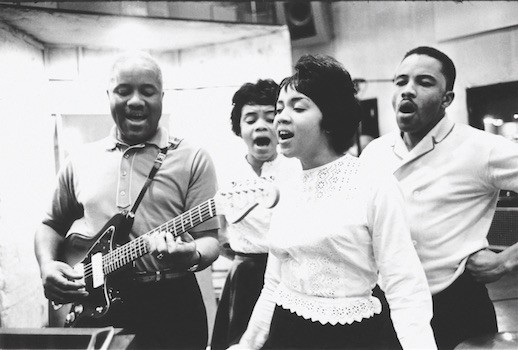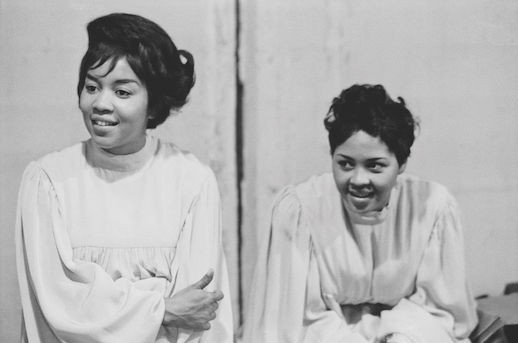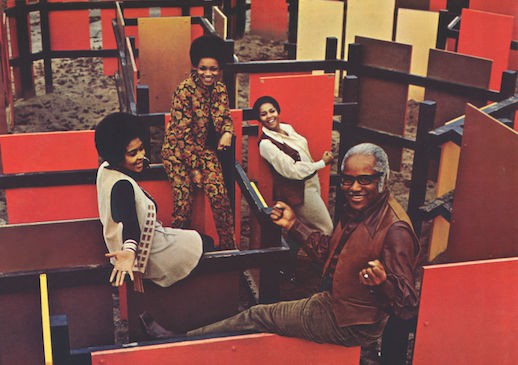The Staple Singers – Faith & Grace: A Family Journey 1953-1976
A limited edition box set, compiled and produced by Joe McEwen.
Review by Tim Tooher.
Recently released by the Concord-revived Stax, Faith & Grace collects together music made by the Staple Singers over twenty-three incredible years. It’s an astonishing collection of music. From the rawest gospel that feels like it’s wrought from the very rocks of the earth, through softer Civil Rights-era gospel folk, to more conciliatory gospel-soaked pop and finally proud and mature soul music.
The Staple Singers brought together gospel and the blues. They weren’t the first to do so and, in reality, the two have always been intertwined, but they did it better and longer than the rest. Their body of work is unparalleled and Faith & Grace is the best collection of it yet put together.
As a nice, middle-class English boy, my religious upbringing was in the Church of England, where worship was All Things Bright and Beautiful, the buttoned-up purity of Victorian Anglicanism. But, surely, if the divine exists, it is closer in sound to the tenebrous, spooked atmosphere of Pops Staples’ scratching-at-the-walls guitar and the deep earth-scraping rumble of Mavis Staples’ voice.
If there is a God, that God can surely be found in the rumble of the thunder, the crashing of the sea on the rocks, the breaking of bones, as much as in the beauty of a flower or the glory of a sunrise. The holy is unholy. If the universe has a God, it’s a creature of darkness as well as light. If God is out there, God has the blues. God is the blues.
Anyone who’s ever listened to soul music, country music or the blues, anyone who’s lived a life, knows that love isn’t a pretty thing either. Love hurts. Love is primitive and raw too. Birth, life, death, joy, rage, pain. If there is a divine, it bequeathed all of these to us. The divine would surely be as gutturally earthbound as transcendent. It would sound like the Staple Singers and the chaos sometimes barely contained within their throbbing rhythms.
Right from the first track, Faith & Grace is pure gold. “It Rained Children” is lighter on the guitar than some of the group’s other work, but it has the same undulating rhythm that sucks you in, the guitar, piano and voices creating a small storm of sound over which Mavis Staples preaches the gospel of divine destruction. There were two things that made the Staple Singers stand out. The first was Mavis’s voice. It could be an instrument of holy terror, almost brutal in its power. Amazingly, when “It Rained Children” was recorded Mavis had only just turned fourteen. It’s almost unnatural that a fourteen-year-old girl should be able to sing with such biblical force. She sings of a cleansing flood with the same fury as the waters that her words imagine. Incredibly, she was just starting out and her control over this immense tool would only get better. Seeing the evolution of this fearsome weapon of a voice is one of the great joys of this box set.
Christianity takes many forms. The religion is shaped by the people who form it and by the place where they live. The African-American church came up through the stealing of African bodies, their displacement and enslavement. It was formed in a world of horror. Of stripped liberty and denied humanity. It’s not hard to see how ideas like a cleansing flood might appeal. Of a better life in another world. It was a Christianity born of the denial of human rights, of the denial of self. It was a Christianity that found hope in something beyond the here and now, in later reward for present suffering. It’s from all this that gospel gets much of its power, because that aching for something better, the belief that a better day will come is universal. It is the sound of hope, striving, rebellion, defiance.
The blues was forged in the same fire. And it too is universal in its themes. Two musics made by the same people in the same place. Two sides of one coin. The Staple Singers brought the blues to their gospel. They brought it in the form of Pops’ guitar, an instrument as elemental in its magnificence as his daughter’s voice. On “I’ve Got A New Home”, it dances between the voices like a skeletal spider. It’s a musical incantation. The sound of the wind in the cornfield. Almost supernatural, it has an ensnaring, hypnotic power. The song itself is gospel for the modern age. Mavis singing “Tell operator to give me long distance” feels like a precursor of Chuck Berry’s “Memphis, Tennessee”, which was still four years away from release, and in this we can hear gospel influencing rock and roll. Just as we can hear Sister Rosetta Tharpe in Chuck Berry’s guitar playing, we can hear her too in the Staple Singers’ fifties recordings.
This musical appropriation could even reach across the Atlantic. The Staples’ 1958 “This May Be The Last Time” is the clear inspiration for The Rolling Stones’ “The Last Time”. It’s one of the miracles of rock and roll that a record made in one world could touch people born into an entirely different one via the transport of small, black slabs of plastic.
If the Staples influenced the white music of the sixties, they were influenced by it too. And particularly by the music of Bob Dylan. Four of the songs here came from his pen. By the early sixties, the Staples had started to experiment with a different folkier sound, undoubtedly influenced by the folk boom of the time. At the time, folk was, like gospel, a music of rebellion. A music that looked to a better world. For the Staples, it was a natural fit. Their sound became more open, easier to listen to, yet lost none of its power.
Dylan was a product of listening. He listened to music, he sucked it all up. One of the groups that had most influenced him was the Staples. As James Miller’s excellent sleeve notes tell us, Dylan remembers hearing the Staples for the first time as being “like the fog rolling in”. So it’s not surprising that in Dylan’s “A Hard Rain’s Gonna Fall”, we can hear echoes of a hundred flood songs, including “It Rained Children”. It must have been incredible for the young folk singer to hear The Staples sing this song. To hear his song be taken back to the source. Their version is martial and relentless, its mechanical rhythm supports the call and response between Pops, Mavis and her brother and two sisters, It’s a magnificent performance and one that needs to be played loud. And like the Stones stealing the chorus of “The Last Time”, it’s the sound of two worlds coming together.
As good as their version of “A Hard Rain’s Gonna Fall” is, it’s their version of “Masters of War” that’s the real revelation. Here, it’s Pop alone that sings the lead. His voice is more vulnerable than Mavis’s, but it still has the strength and certainty needed to sing this song of defiance. It’s his guitar that’s the star though. It’s almost mathematical, constantly repeating the same pattern over a cascade of military drums. It’s a funeral dirge for people who are yet to die, for the people the song wants to die. A record of enormous power.
This collection is full of such moments. In the middle of disc three, we have two songs that alone would make a group great. “Freedom Highway” was recorded live a few days after one of the Selma to Montgomery freedom marches. It’s raw and chaotic, an explosion of sound that celebrates the marchers and asks why they had to do what they did. Its both report and protest. A song of its time that still reverberates in ours. “Why (Am I Treated So Bad)” is as powerful as any song about American racism. Like Fats Waller’s “Black and Blue”, it decries the condition of black lives in America and asks straight out, “Why?”. It’s a phenomenal record, a musical bruise on the American soul. It’s hard to imagine the Civil Rights Movement without songs like this and equally hard to believe that the movement would have had the success it did without them.
The Staple Singers made music that was of its time and for its time, music that was engaged and politically active. They’re proof of the power of song and the human voice. They made music during a time of immense social change and that’s reflected in the records they made.
One example of this is “Slow Train”. Recorded for Stax in 1968, only months after the assassination of Martin Luther King, it’s hard to hear it as anything other than a song about civil rights and also as a kind of follow-up to The Impressions’ “People Get Ready”. Yes, that train is coming, but it’s not coming fast. It’s a song that manages to be both positive and sad. The exuberance of “Freedom Highway” has gone, but the hope is still there. Maybe a little battered, but there all the same.
By the time they were recording for Stax, the Staples sounded like an entirely different group to the one that had made the gutbucket gospel records of the previous decade. Mavis was now a woman and not a schoolgirl and her voice had become a more mature, more controlled instrument, with a softer edge. On “When Will Be Paid”, she sounds stronger and wiser, more sure of herself. The song itself is poppier than much of their earlier music, but that belies the lyric, which is a direct claim for compensation for the work and suffering endured by African Americans for three hundred years. It’s a catalogue of injustice, and evidence that pop and politics do mix.
Stax brought The Staples hits that are still heard on the radio today. “Respect Yourself”, “If You’re Ready (Come Go With Me), “Heavy Makes You Happy (Sha-Na-Boom-Boom)”, “I’ll Take You There” and more were great pop music, yet still records that carried the history of the band and showed how much they’d learned. For me, though, one of their greatest records was still to come.
“Let’s Do It Again” was recorded for Warners in 1975. Written and produced by Curtis Mayfield, it was the Staples’ biggest hit and as far away from the sacred as they ever got. Mavis is definitely no longer the fourteen-year-old schoolgirl who sang “It Rained Children”. This is a woman in her mid-thirties, relaxed and confident in her sexuality with a voice that tells the songs story just as clearly as the words.
From apocalyptic gospel to honeyed sensuality, this box set tells the story of the group as they grew, found new influences and responded to the world around them. It’s a labour of love, that’s beautifully packaged with a series of enlightening short essays. Give it a home and you’ll find yourself coming back to it again and again, each time discovering new wonders.


